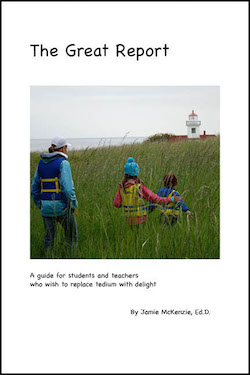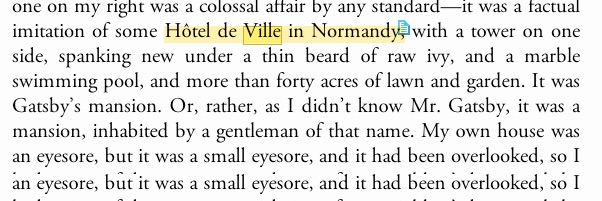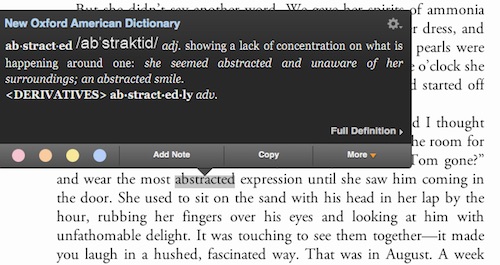Order McKenzie books online with a credit card
Bring Jamie to your school or district for a great workshop.
September Issue
Vol 26|No 1|September 2016
 |
|---|
As reading goes digital
By Jamie McKenzie (about author) |
Schools should take notice. According to a September, 2016 report issued by the Pew Research Center, "Book Reading 2016," many Americans are doing more of their reading in electronic formats than before. While printed books are still preferred by a large majority when reading books, if you look at all kinds of reading (not just books), smart phones, tablets, laptops and other devices are gaining ground rapidly. If you are reading this article online, you are an example of people reading digitally to explore questions and issues. The Pew study does not break out different kinds of reading by platforms, sadly, as the prime focus is on books. This article asks how schools might prepare students for digital reading. Is it just like reading words on paper? Or is it different? Three Major Ways Digital Reading Enhances and EnrichesMost people assume the platform doesn't matter. They may focus on whether one device feels more comfortable to hold. Printed books win many kudos for their appeal in this respect and usually win when thinking of bringing a book to bed. But it turns out that digital reading offers several distinct advantages over a printed book. Advantage #1 - NotesMany readers make notes in the margins of printed books, while some feel this is a sacrilege. It turns out that such note-taking and interaction with the text may dramatically improve understanding. E-books make this kind of note-taking easy, and they add other features to the note-taking that surpass what is possible with a printed book. See "Knowtation: Reading and Thinking Between the Lines and Around the Edges." This note-taking was thoroughly explored in "eReading: How is reading changing with the advent of eBooks?" and "The New Book, the New Reading and the New Reader: We're talkin' 'bout a revolution." To appreciate the added value of eBooks, teachers will need to incorporate this type of reading into their own lives. It may take reading a half dozen books of different kinds to grasp the benefits. Reading nonfiction, for example, may be enhanced more by the online resources accessible through an eBook than when reading a novel. As teachers read and explore, it might help to think of reading now as a conversation with the book — more interactive than it has been in the past. The list below provides examples of how this dialog might proceed. Tasks for readers . . .
Advantage #2 - Enrichment and Lateral Reading
To replicate this feature with printed books, the reader would have to comb the library's stacks or keep a 20 volume encyclopedia at hand. One could also keep a laptop at hand to do this searching, but reading digitally facilitates both the harvest and the storage of what the reader finds all on the same device. The result of this feature is enriched understanding. The cost of including images in printed books was hefty in the past, so most novels included very few, and even printed history textbooks would rarely offer more than a single image to illustrate an important event like the battle for Fort Sumter that began the American Civil War. The Internet serves as a great partner to both novel and history book, offering up a rich array of images that one would rarely see in a printed book.
In Fitzgerald's The Great Gatsby, there are few illustrations, so when he described Gatsby's mansion, it is hard to picture it. Highlighting the phrase
"Hôtel de Ville in Normandy," and going to the More menu, the reader is served up a wonderful collection of images from Google that easily surpasses the imagination of most readers.
One could also Google "Gatsby's mansion" and discover that movie images look quite different from those above, since a Hôtel de Ville is actually a city hall in France. It is amusing that Fitzgerald used this phrase to describe a mansion, since he was a frequent visitor to France, but few of his readers would have noticed his slip because they were restricted to words at the time. Movie producers, since images are their specialty, would know to replace the city hall with a true mansion, as you can see for yourself.
At one point, in The Great Gatsby, Nick Carraway, the narrator, is having a conversation with Jordan Baker in the tea-garden of the Plaza Hotel. Fitzgerald does not describe the room, but how many readers have been there? In rushing through the words, many readers miss important scenery. It is a remarkable room, and the Kindle software takes the reader there in a matter of seconds. Some would argue this is an unnecessary distraction, but the success of the Gatsby movies suggests the value of adding images to narrative. To appreciate the society portrayed in Fitzgerald's novel, it helps greatly to picture the events - not just read them.
Why is this called "lateral reading?" Edward deBono coined the term "lateral thinking" to capture thought that explores widely, out of the box and creatively in contrast with "vertical thinking" which is more logical, analytical and convergent. When applied to reading, the phrase refers to enrichment, expansion and the amplification of understanding. The eBook supports exploration beyond the pages of the book itself in ways that brings greater meaning to the page where the reader started. Advantage #3 - VocabularyIn Orwell's 1984, the state did what it could to end "crime-think." They hoped to limit most citizens to a vocabulary of under 1,000 words, since a rich vocabulary was the foundation of critical thinking. If citizens possessed few words, they would question and challenge government decisions less frequently. In 2016, folks with limited vocabulary are also more likely to vote for a demagogue. How often do you see folks reading a print book with a dictionary at their side? If one encounters a new word in a print book, how likely is it that the reader will cross the room or go upstairs to find the dictionary? In most cases, they will just keep reading.
In an ebook, as the reader selects the mystery word, a definition pops up like the one above. This is so easy that it is no longer acceptable to pass over strange words. It is difficult to predict the consequences of students looking up thousands of words as they read. It is a startling departure from past practice. We do know that a strong vocabulary dramatically improves reading scores. If we can develop a thirst for understanding new words, the payoff might be impressive. A rich vocabulary?
The above diagram was reproduced here ProspectsAccording to most reports, digital reading has been slow to catch on in most schools.
Many of the obstacles to eBook adoption usually mentioned relate to practical issues, but articles like the one above do not explore the potential of eBooks to change and improve the reading experience. This change is more likely to occur when teachers of reading, literature and history spearhead the effort, showing students the powerful features mentioned in this article. What are the chances of this happening? For schools to embrace this change fully, staff members must first enjoy the benefits of eBooks in their own lives. School leaders with vision should launch summer professional development sessions that introduce the benefits of this kind of reading to teachers so they will want to turn around and share their enthusiasm with students.
|
|---|









